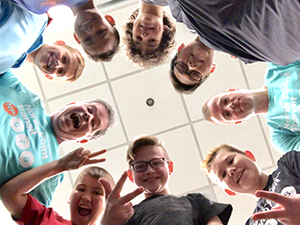Last Sunday I began serving in Transit (the Junior High Ministry at North Point Church). This is also the beginning of my 25th year in youth ministry (pats himself on the back). I was surprised by something that I think is worth passing on.
In the past, having a co-leader meant having a former student come alongside me to serve. Since the person already had me as a leader, he would already know my style and understand my approach to leading. This made being my co-leader much easier for them.
However, I am new to Atlanta so my co-leader is a stranger I met for about 10 minutes the day before we launched. He has never served in youth ministry and is a pretty new Christian. He’s learning what it takes to be a youth leader and what it means to be a Christian at the same time. I’m already at a full sprint while he’s wondering how to tie his shoes (that’s not a slam, just an illustration of our place in the task of leading.)
What I learned by having a new leader who doesn’t know me and has never done youth ministry is that what I do naturally can be new and confusing to him. Questions he has in his mind which seep out through his reactions and confused glances were:
- Why does he want a bio and a selfie of me to put in a parent letter
- Why did he bring a small white board?
- Why is he having each student write their name on the board, then taking a picture of them holding it?
- Why is he handing his computer to parents as they drop their kids off and asking them to type in their cell phone numbers?
To the untrained eye, this can all seem a bit stalker-ish and unnecessary. From the perspective of the veteran, here’s what I know and why instinctively do what I do:
- I know parents are (or should be) very concerned about anybody in their child’s life
- I know the more information I offer up about myself and the group (goals and plans), the more comfortable they’ll feel (and supportive they’ll be)
- I know when a student knows I know his name, he knows I care
- I know when a student receives a postcard with a picture of our group on the front and a personal handwritten message on the back, he’s more likely to value the group and the parents are more likely to be impressed and appreciative about what’s goin on
- I know when a student who didn’t show up gets that same postcard and sees he missed a chance to be in the picture, and reads the invitation to be there next week, he’ll feel left out and (hopefully) be more interested in showing up next week
Here’s what I’m going to do with my new co-leader, I’m going to let him in on some of the why’s behind what I’m doing. Many of the things he has questions about, I’ll let him find the answer by seeing the results of the “strange and unnecessary” things I’m doing. Some lessons are best caught, not taught.
My challenge to readers:
Veteran youth workers: Find somebody to mentor/co-lead to raise up new leaders
Newby youth workers: Hang in there when things don’t make sense. Ask questions and pay close attention to the results to learn the reasons behind what veteran leaders do. Youth ministry is about way more than getting through a curriculum; it’s largely about building the relationships that enable students to want God to work in their lives the way he does in yours.







Leave a Comment